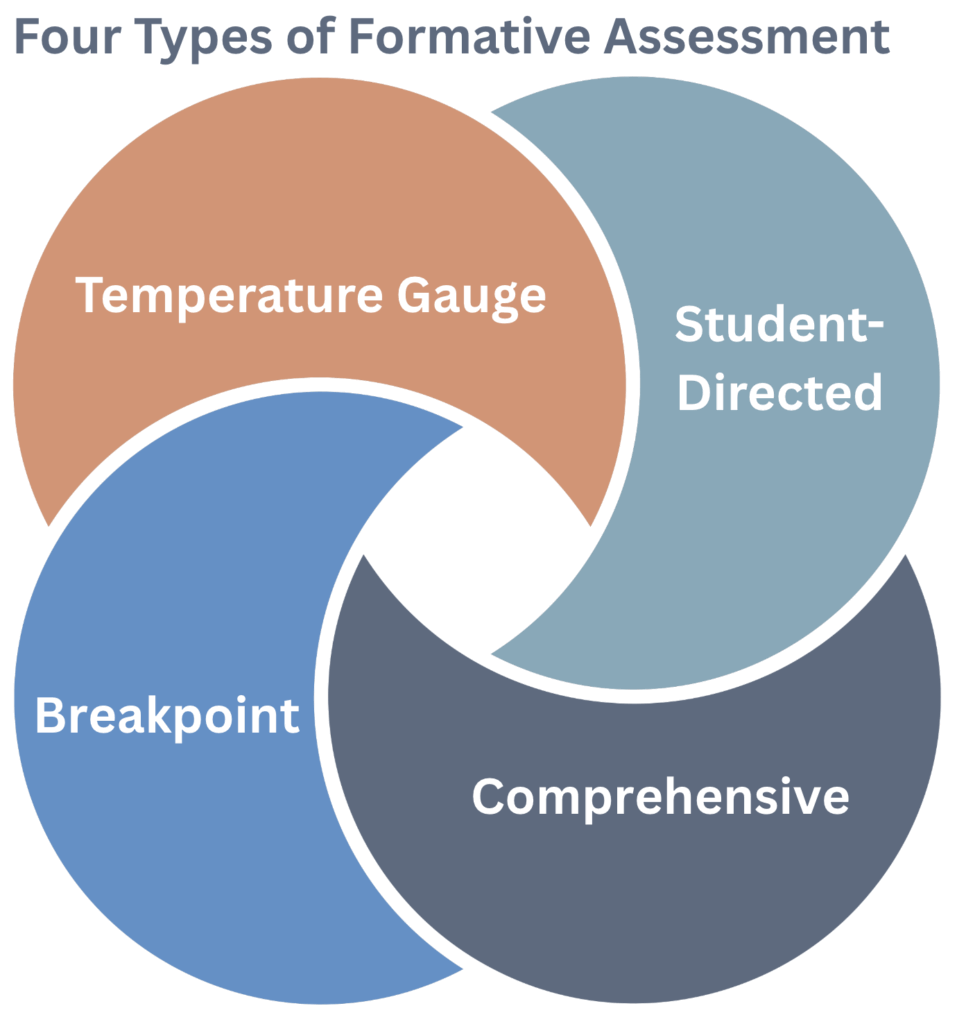
The word assessment comes from the Latin assidere, meaning “to sit beside.” That image—teacher and learner side by side—captures what true assessment is meant to be: not judgment, but partnership.
As Dr. Nancy Sulla said, “Assessment should not be about what teachers do to students but what students do for themselves.” When we sit beside learners, we empower them to notice their own growth, reflect on their process, and set goals for what comes next.
Today’s classrooms are redefining assessment to match this vision. Formative, performance-based, and competency-based approaches all shift attention from measurement to meaning—helping students apply learning, not just recall it.
Rethinking Assessment in Education: From Evaluation to Empowerment

In IDE Corp.’s Four Types of Formative Assessment, teachers use ongoing data to inform instruction and personalize learning.“ Data collected from assessment, particularly during unit implementation, will inform instructional choices and support student progress.” These check-ins, reflections, and conferences create a feedback loop that keeps learning fluid and individualized. Teachers observe, question, and adjust—assidere in action.
Formative Assessment: Turning Evaluation Into a Continuous Conversation
Formative assessment strategies give teachers the power to personalize learning in real time. Quick “temperature gauges,” end-of-class “breakpoints,” student reflections, and comprehensive conferences create multiple entry points for feedback. Each interaction informs facilitation and helps shape the next step in a learner’s journey. This ongoing dialogue between teacher and student transforms assessment into a shared experience of growth and discovery. IDE’s Five Levels of Content Facilitation Questions describe how assessment and instruction merge when a teacher truly sits beside a learner. Each level is both a question and an assessment moment:
- Comprehension – What do you understand?
- Application – Where can you use it?
- Connection – How does it relate to your life or world?
- Synthesis – How could you combine or create something new?
- Metacognition – How did you think through this? What will you try next?
These facilitation questions transform assessment into a dialogue of discovery—revealing understanding while cultivating the very skills that drive lifelong learning.
Performance-Based and Competency-Based Assessment: Measuring Future-Ready Skills
The future of learning demands more than mastery of standards; it requires mastery of skills. According to the World Economic Forum’s Education 4.0 agenda, “problem-solving, collaboration and adaptability are the three critical skills that Education 4.0 must impart to students.”
The Future of Jobs Report 2025 expands that list, identifying creative thinking, resilience, flexibility, agility, curiosity, and lifelong learning as the fastest-rising global competencies. Employers expect nearly 40 percent of key skills to change by 2030.
Performance-based and competency-based assessments are built for this reality. They ask students to demonstrate understanding through application and innovation—writing proposals, designing models, analyzing data, or presenting solutions to real-world problems. When teachers facilitate these experiences, assessment becomes an incubator for future-ready skills.
Sit Beside the Future and Cultivate Future-Ready Skills Through Assessment
Technology may collect data, but only humans can interpret growth, spark curiosity, and nurture courage. The next era of assessment is:

- Formative in spirit – responsive and adaptive.
- Performance-based in design – focused on authentic transfer.
- Competency-driven in structure – anchored in mastery.
- Facilitative in method – rooted in questioning and reflection.
To sit beside the future is to guide students toward it—to cultivate thinkers who can create, collaborate, and adapt in a changing world. Assessment, reimagined through assidere, is how we get there.
Contact us at solutions@edquiddity.com for a complimentary consultation and brainstorming session on rethinking assessment practices and explore our VLC on Using Formative Assessment to Drive Instruction.

 In this course, participants will leverage choice and technology to provide students with the ultimate differentiated learning environment. They will develop differentiated digital activity lists rooted in rigorous instruction that offer multiple ways to learn and apply content. Participants will explore autonomy, purpose, and mastery as motivators in all learning environments. They will design differentiated activity lists to put students in charge of their own learning, creating a structure that allows students to make decisions within a structured framework. Making informed decisions is an essential life skill that teachers can support with intentional classroom practices.
In this course, participants will leverage choice and technology to provide students with the ultimate differentiated learning environment. They will develop differentiated digital activity lists rooted in rigorous instruction that offer multiple ways to learn and apply content. Participants will explore autonomy, purpose, and mastery as motivators in all learning environments. They will design differentiated activity lists to put students in charge of their own learning, creating a structure that allows students to make decisions within a structured framework. Making informed decisions is an essential life skill that teachers can support with intentional classroom practices. Participants in this course will use Reinventing the Classroom Experience by Dr. Nancy Sulla as a resource. The assigned book must be
Participants in this course will use Reinventing the Classroom Experience by Dr. Nancy Sulla as a resource. The assigned book must be